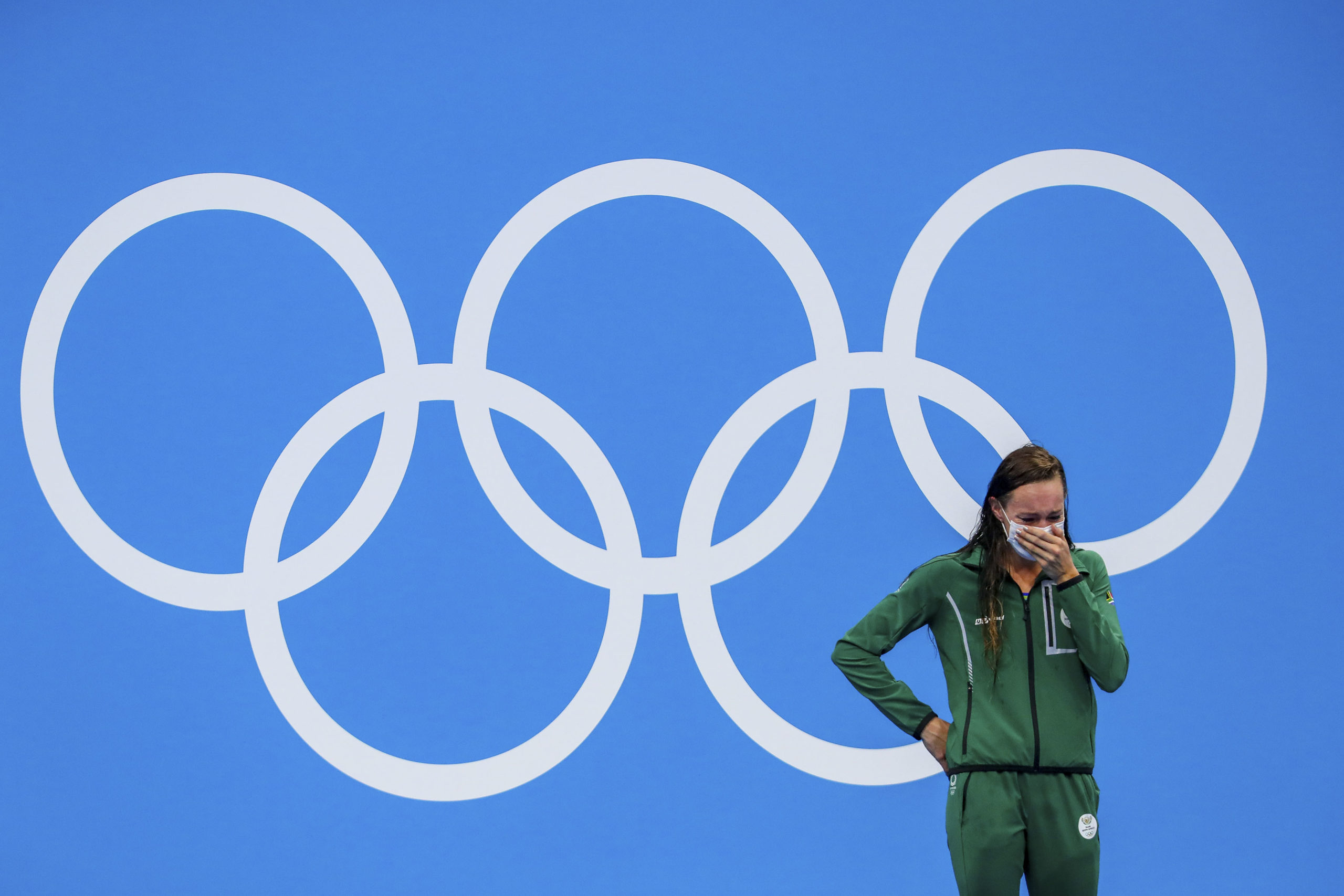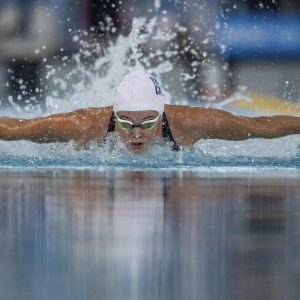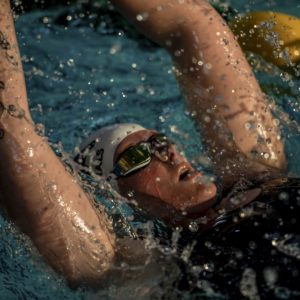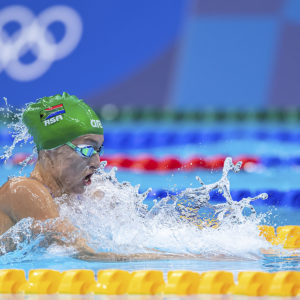Tatjana Schoenmaker shines in the limelight
The Olympic swimmer who took gold and silver in Tokyo is learning how to handle her newfound fame and characteristically figuring out how to use it for good.
Author:
26 November 2021

The delayed 2020 Olympic Games launched Tatjana Schoenmaker into South Africa’s collective consciousness. Where previously she avoided the limelight – preferring to do her talking in the pool – she now champions women’s swimming in South Africa. And it’s a role she seems comfortable taking on.
The 24-year-old spearheaded a phenomenal comeback for women’s swimming at the Tokyo Games, becoming the first woman since Sydney 2000 to win a medal in the pool at the Olympics. Just five years earlier, South Africa had failed to send a single female swimmer to the global showpiece. The country last featured women at a major international event in the long-course, or 50m, pool at the 2013 world championships.
Related article:
“Looking back at 2016, there were no girls in the team. We were so young, so it’s nice to see how the girls decided since that year, when the media and stuff were so negative, to change it up and say, ‘You know, we will show them,’” says Schoenmaker. “We’ve proven it to them, and we were one more girl in this team [compared with the men’s team in Tokyo]. We’re challenging the guys every single time. So 2024, we might even be an all-girl team. Who knows?”
The swimmer from Pretoria announced herself as a future swimming prospect when she missed out on qualifying for the 2016 Olympic Games in Rio by a split second, and has grown both in stature and emotionally since then. Schoenmaker now breathes rarefied air as a result of her heroics in Tokyo, where she won the 200m breaststroke, setting a new world record, and took silver in the 100m event.
Home-grown talent
She leads by example, boasting multiple national and continental records, Olympic gold and silver, double Commonwealth Games titles and a world silver medal. And she once again proved that South Africa does not have to export its talent to the United States. The bachelor of commerce graduate in financial sciences followed in the footsteps of Cameron van der Burgh and Chad le Clos as home-trained swimmers who made it to the pinnacle of the sport.
“I hope that what I did will give a little bit of hope that we can do it here in South Africa. We don’t have to go overseas … It’s just about pushing through those tough times. No one’s life, whether you’re a swimmer or something else, goes uphill all the time. There are downs. Do you have the right support system? Do you have the right way of thinking to get through those dips?”
The congenial swimmer admits that she is still coming to grips with her newfound fame. Fading into the background is an even greater challenge in the not-so-inconspicuous car she got from a sponsor after Tokyo. “It’s almost crazy to think that three months ago … no one knew who I was. I was still able to get away with a lot of things. Unfortunately I can’t now, because I’m driving a bright yellow Mustang. So much has changed. I’m driving my dream car and I’ve met some amazing people through this.”
Related article:
True to character, Schoenmaker is paying her good fortune forward with the launch of the Tatjana Foundation, which “will be a shining light, a blessing to others just as I have been blessed”.
She plans to put the money that was raised through crowdfunding towards her charitable causes. “It’s such a blessing in some ways and a challenge in others, because it’s something you’re not used to [the limelight], and me being very conservative and liking being in the background,” she says. “Now, I get to grow and hopefully I can grow into someone that can inspire someone else. And that’s why I also had to launch my foundation, because I want to give that hope to someone else.”
Setbacks and learning
Schoenmaker says her recent success camouflages the tough times, when she came painstakingly close to throwing in the towel. “Swimming is an all-year round sport … It’s basically every single day. It’s not easy mentally and it’s not easy physically.
“There are a few times that you want to give up, but I think you have to realise where you are in your mindset and whether you are doing it because you love it or because you want to get something out of it,” says Schoenmaker, who was recently announced as Discovery Vitality’s latest ambassador.
Related article:
Schoenmaker speaks about the difficulty of hitting a plateau, an extended period where there seems to be no progress. Progress is the essence of competitive swimming, shaving off a few milliseconds here, improving a stroke there, to edge closer to what may seem like an impossible standard.
The two-time Olympic medallist’s ability to treat each setback as a learning experience has forged her character. “If I have to go through a tough time without swimming PBs [personal best times] for three years, then what do I learn out of it? That’s the amazing thing about my swimming. It shaped my character in more ways than you could imagine,” she says. “By just pushing through, it creates that perseverance in you, and it creates that discipline in you … I didn’t have to be the best performer, but I was able to grow in such a way that I became like that.”
Small steps
Schoenmaker and her coach Rocco Meiring, sing from the same hymn sheet. The podium is never mentioned. Instead, they preach the improvement gospel, swimming a personal best, graduating from one championship to the next.
It is perhaps this measured approach that has seen the swimmer bloom into the star she is today without breaking down like so many other talents in recent years. Meiring slowly but surely exposed Schoenmaker to the pressures of international swimming, first targeting success at the World Student Games before graduating to the next level. She qualified for her first long-course world championships in 2017 but opted to go to the World Student Games in Taipei instead. There she earned her first major podium finish, winning silver in the 200m breaststroke.
“The journey of stepping up at every level of competition worked out perfectly for me because the World Students is obviously much lower, but it’s still a great competition. Then you have Commonwealth, then world champs and the Olympics,” she says.
Related article:
“That progression didn’t put me under a lot of stress … You see how you handle certain situations and you know how to prepare for that next little step. The big steps are the ones that are challenging to try and handle or cope with. You can only cope with it the next time you go there.”
Before her historic double gold at the 2018 Commonwealth Games in Australia, there were questions over Schoenmaker’s mental fortitude, with critics referencing the 2016 narrow miss and her decision to opt out of the world championships in 2017. She dispelled these notions in emphatic style at those Commonwealth Games. But it is the way she earned the 100m and 200m double that demonstrated her mental toughness.
Go your own way
With the 200m breaststroke gold medal already in the bag, Schoenmaker had her sights on the 100m title. But a niggling groin injury looked to derail her plans. She felt pain in her groin during the semifinals, which flared up again before the final.
“It was the first time Rocco asked if I wanted a painkiller. I don’t like drinking pills or anything, especially before my races,” she says. “The last 50m, I could feel my groin was hurting … I just decided that it wasn’t going to change how I wanted to race. I worked so hard to get to where I was that day, so if the groin was in the way, it had to step aside for a day. You’re not always going to get smooth rides.”
Schoenmaker made history in 2019, when she became the first South African woman to win a medal at a world long-course championship with her 200m breaststroke silver in Gwangju, South Korea. In Tokyo, she nearly earned the rare 100m and 200m breaststroke double – a feat only South African legend Penny Heyns has achieved, in Atlanta in 1996 – but had to be content with gold and silver.
Related article:
“It was a steep learning curve at the Olympics, because I did not focus on my own race. The main goal was to get in front of Lilly [King],” says Schoenmaker. “I knew I was ahead of her and I thought, ‘Just hold on, just hold on, I can do this.’ And when I looked to the other side, I realised, ‘Oh my word, the girl is in front of me.’ When she passed me, I knew she was going to win.
“I was smiling and laughing, thinking, ‘Well done, girl.’ She stuck to her game plan and won. I couldn’t have been happier for someone. It was God reminding me that I cannot swim for someone else, I can only swim for myself. And that is what I did in the 200m, and it paid off.”





